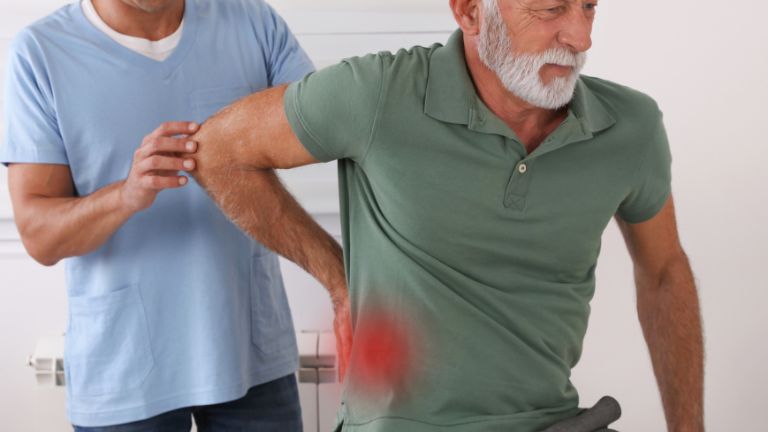Millions of people around the world experience kidney pain, it is a condition that many people still don’t understand. Located in the lower back, just above the waistline, the kidneys play a vital role in filtering waste and excess fluids from the blood. The kidneys which are situated just above the waist in the lower back are essential for removing waste and extra fluid from the blood.
Understanding the location of the kidney is important to knowing kidney pain. Imagine two bean-shaped organs that are tucked away between the hips and ribs snugly on either side of the spine. In this article post, we will share the information about what is the position of the kidney pain with its causes, symptoms, and treatments.
What is a Kidneyache?
Renal pain is another term for kidney pain that is felt under your ribcage, across the middle of your back, and on each side of your spine. Additionally, it might expand to your abdomen, groin, or sides. Because of where the kidneys are located in the body, it is frequently mistaken for backache. This pain is a dull pain which can affect left or right sides of the body. It can result because of a number of health conditions, like kidney stones, infection, trauma, cysts and dehydration.
Several kinds of kidney pain each with unique traits. Acute pain is intense and abrupt with a brief duration. Conversely, chronic pain is frequently accompanied by additional symptoms. Whereas dull pain persists and causes ongoing discomfort sharp pain comes on suddenly.
Kidney pain is caused by a number of factors.Kidney stones, which are hard mineral deposits, cause excruciating pain when they pass through the urinary canal. Bacterial invasion causes inflammation and kidney infections also known as pyelonephritis. A genetic condition known as polycystic kidney disease (PKD) results in kidney cysts that hurt. Kidney pain can also result from cancer blood clots and kidney damage.
What are the Main Causes of Kidneyache?

Renal pain can be caused by the various reasons, which are mentioned below:
- Hemorrhage
- Blood clots
- Dehydration
- Kidney cysts
- Kidney stones
- Kidney trauma
Some medical problems that can result in this pain are:
- Hydronephrosis
- Kidney tumor
- Kidney infection
- Polycystic kidney disease
Sign & Symptoms of Renal (Kidney) Pain
This pain can feel like a dull backache or it can be sharp and sporadic. Here is a list of some additional symptoms that may occur with this type of pain.
- Fever or chills
- Feeling unwell
- Vomiting
- Pain that radiates to the groin or lower abdomen
- Pain or itching while passing urine
- Fluid buildup
- Confusion or fogginess
- Feeling weak or tired
- Blood in the urine
- Nausea
- Less urine output
- Irregular heartbeat
- The urgent and frequent need to urinate
- Loss of appetite
- Diarrhea
- Smelly urine
- Cloudy urine
Where Can Kidney Pain Manifest?
This is usually located in the lower or upper part of back, it frequently feels worse. But, you may feel this back discomfort in your upper half on your back, not the lower half of the back. Usually, the first signs of kidney discomfort appear beneath your ribcage, to the right or left of your spinal cord. Furthermore, this might spread to other areas of your body, such as your stomach or groin.
Sometimes, individuals is confused with back pain due to the location of the kidneys in the body so they should speak with their doctor about the pain. A health specialist claim that backaches are caused by muscular issues and commonly affect the lower back.
However, the most frequent causes of kidney pain are kidney stones and infections. This pain may be more intense and elevated in your upper back and beneath your ribs. In this condition, you can drink lots of water and avoid urinary infections, which can help prevent kidneyache.
Care & Treatment
The cause of kidney pain determines the course of treatment. If you have kidney pain due to an infection, your physician may suggest antibiotic medicines. If your renal pain is coming from stones, you might need medical treatment to minimize it. Before starting treatment you may need to determine the exact cause of this pain.
Imaging tests (ultrasound, and CT scans), blood tests, urine tests and physical examinations are all used to diagnose kidney pain. Depending on the underlying cause treatment options may include pain control antibiotics for infections, kidney stone or cancer surgery, and drugs for damage or inflammation.
To determine the cause of your kidney pain and the best course of treatment, you should consult with your personal doctor. Some of the many methods for treating this pain condition are mentioned below:
1. Medications
- If kidney pain is related to inflammation, it may be useful to lessen it with non-aspirin pain relievers, such as Ibuprofen (Advil Motrin).
- If you are experiencing kidneyache and a fever, Acetaminophen medication can help in reduce your fever and pain.
- Always follow to the dosage recommendations on the medication label. You should consult with a medical professional, if you have any questions or concerns regarding for pain relief options.
2. Home remedies
- Keeping the urinary system free of bacteria is facilitated by drinking excessive amount of water.
- Applying a heating pad on your side or stomach can help in reducing pain.
- The body recovers from a kidney infection with the help of enough sleep.
- Avoid drinking alcohol or coffee as they can intensify the urge to urinate.
- Avoid excessive sugar and salt because they can eventually damage your kidneys.
Conclusion
Kidney pain is frequently misinterpreted, it can be effectively treated with education and medical care. People can reduce discomfort and safeguard their kidney health by identifying the symptoms.
Kidney pain can have affect on day-to-day living, but it can be managed. By being aware of the causes, signs and available treatments people can take charge of their kidney health.

